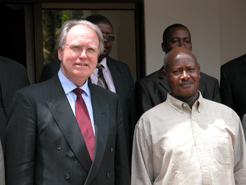Uganda President Yoweri Kaguta Museveni said his government will "see what we can do" to resolve Sabbath, or Saturday, scheduling conflicts faced by more than 300 Seventh-day Adventist students at the country's Makerere University, the nation's leading public tertiary school.
"I will consult and we will see what we can do to resolve the issue," President Museveni said during a May 9 meeting with Pastor Jan Paulsen, world president of the Adventist Church, who is on his first visit to Uganda. The state president said he would instruct the university's chaplain to investigate the matter.
The situation at Makerere -- one of Africa's most renowned institutions -- came to a head in October 2003, when Uganda's Constitutional Court dismissed an appeal filed by three Adventist students claiming the school was infringing on their religious rights by scheduling classes and exams on the Sabbath. Although the Adventist Church operates its own university at Bugema, Uganda, church leaders assert that because Makerere is a public university, its facilities and schools should be open to all eligible students since their families provide taxes to support the institution. Adventist colleges and universities in East Africa do not yet have schools of law, medicine or veterinary medicine, these leaders note, and Adventists who wish to enter these professions must attend other universities.
After the visit, Paulsen called his talks with President Museveni "significant and worthwhile."
Museveni told Pastor Paulsen that he attended an Adventist elementary school near his home village of Ankole in Western Uganda.
Before presenting a gift to the head of state, Paulsen prayed for the president as well as the Ugandan people. According to a statement released by Museveni's office, Paulsen also expressed hope that the Adventist Church in Uganda would work with the government to help eradicate poverty.
Earlier, the Adventist leader told the media he was happy to visit the East African nation, which he called a "long overdue" trip.
"I lived and worked in Africa for more than six years, but this is my first visit to the country of Uganda," Paulsen, said at Entebbe Airport on May 6. "And I have been looking forward to it. I'm sure the smiling faces of my spiritual family will also reflect the beauty of the countryside."
Paulsen explained, "The Seventh-day Adventist Church is a religious community primarily present to enhance the quality of life of individuals; we are not a political body. The church is heavily involved in [Ugandan] education. There are some 118 primary schools, 24 secondary schools and one university at Bugema. We are also involved in health."
Paulsen continued, "the church has established a HIV/AIDS office in Africa, in Johannesburg, because it wants to assist the community in the fight against the disease. And I want to commend the government of Uganda for leading the way in addressing the problem and in many ways the government has become a model for other countries."
Visiting the Adventist secondary school at Bugema, Paulsen dedicated a new library which was named in his honor.
"A library is such an important place where minds can soak in knowledge like a sponge and develop and mature intellectually," he said. "It is perhaps the most important part of any school."
At the Bugema Seventh-day Adventist University where 1,500 students are enrolled, Vice Chancellor Elisha G. Semakula officially welcomed Paulsen in a crowded chapel filled with faculty and students.
Paulsen's address encouraged the students in their scholastic endeavors to graduate and to "make society and the world a better place. Use your knowledge for the greater good." After the welcome, Paulsen was invited to participate in the groundbreaking ceremony for a larger chapel to be constructed there.
On Sabbath, or Saturday, May 7, Paulsen was the main speaker at a united worship service held in Nambole Stadium in Kampala. More than 30,000 Adventists turned out, a showing that was a first, church member Moses K. Kibirige said.
After singing by a number of groups including a mass choir of more than 300, Paulsen's sermon contained an appeal to church members to live in harmony with one another, to forgive one another, to be peacemakers and to build up and strengthen each other. [Editor: John T.J. Banks for ANN/APD]

